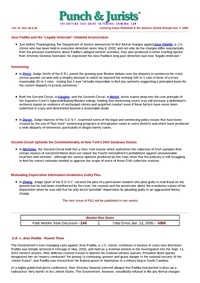In this case, Judge Marrero presented an informative guide to, and a timely analysis of, a question of growing importance in the post-Booker world: Does the fact that some jurisdictions use “fast-track” sentencing programs (in cases involving aliens charged with illegal reentry) warrant a downward departure based on unwarranted …
Defendant challenged a decision from the United States District Court for the Eastern District of Pennsylvania, which denied his motion to suppress evidence, convicted him of a drug offense, and entered a sentence.
After a complaint was received about suspicious behavior, agents discovered that defendant was involved in smuggling …
Here the Second Circuit broadly held that "after Booker, a district court may sentence a defendant taking into account acquitted conduct".
U.S. v. Welch, 429 F.3d 702 (7th Cir. Nov. 21, 2005) (Judge Flaum)
U.S. v. Vaughn, 430 F.3d 518 (2nd Cir. Dec. 1, 2005) (Judge Sotomayor)
In …
In this lengthy decision, the Second Circuit affirmed a ruling by Judge Duffy of the S.D.N.Y. that a New York statute that authorizes the collection of DNA samples from certain classes of convicted felons does not violate the Fourth Amendment’s prohibition against unreasonable searches and seizures - although the …
U.S. v. Welch, 429 F.3d 702 (7th Cir. Nov. 21, 2005) (Judge Flaum)
U.S. v. Vaughn, 430 F.3d 518 (2nd Cir. Dec. 1, 2005) (Judge Sotomayor)
In Apprendi v. New Jersey, 530 U.S. 466 (2000), the Supreme Court established the principle that “Other than the fact of a prior …
Michael Alan Mooney was the vice president of underwriting for United Healthcare Corp., a large health care management service company. In the spring of 1995, United entered into negotiations with MetraHealth, another health insurance company, regarding a possible acquisition by United. Mr. Mooney attended a series of due diligence …
Here the Court vacated the plea of a permanent resident who pled guilty to mail fraud on the ground that he had been misinformed by the court, his counsel and the prosecutor about the mandatory nature of his deportation.
In this case, Judge Spatt granted the petition of …
The Second Circuit held in this case that a defendant's flight from arrest, even when it results in a year-long delay in his apprehension by law enforcement, is not in itself sufficient to trigger the 2-level obstruction enhancement under U.S.S.G. § 3C1.1. Moreover, it ruled, the enhancement is not …
This is another of a growing series of post-Booker rulings that takes issue with the huge sentencing disparity mandated by the Guidelines for cases involving crack cocaine compared to cases involving a comparable amount of powder cocaine. Under the prevailing statutory scheme, 5 grams of crack cocaine carries the …
In this consolidated interlocutory appeal involving 17 defendants whose motions to unshackle were denied without an evidentiary hearing, the Ninth Circuit has struck down, as unjustified, a blanket policy of the U.S. Marshal’s Service to shackle every defendant at their initial appearance in the huge Central District of California. …
Defendant pleaded guilty to being in the United States unlawfully after his removal following a felony conviction, 8 U.S.C.S. § 1326(a), (b)(1). The United States District Court for the Southern District of Illinois sentenced him after United States v. Booker, to 48 months, well below the 10-year statutory maximum …
Petitioners filed an action against respondent, the United States Attorney General and others, to obtain release of petitioner detainee from incarceration in the Kingdom of Saudi Arabia, which they claimed was acting as a surrogate custodian for the U.S. Government. In earlier proceedings the court denied respondents' motion to …
District court did not act unreasonably, in sentencing defendant convicted of possession of crack cocaine, by choosing not to depart downward from the Guideline range based on the differential in punishment for crack cocaine vs. powder cocaine.
In a summary decision, without dissent, the Court ruled that the Sixth Circuit had erred in deciding an issue of state criminal law in direct contradiction of an interpretation given that law by the Ohio Supreme Court in the same case.
In this brief per curiam decision, the …
